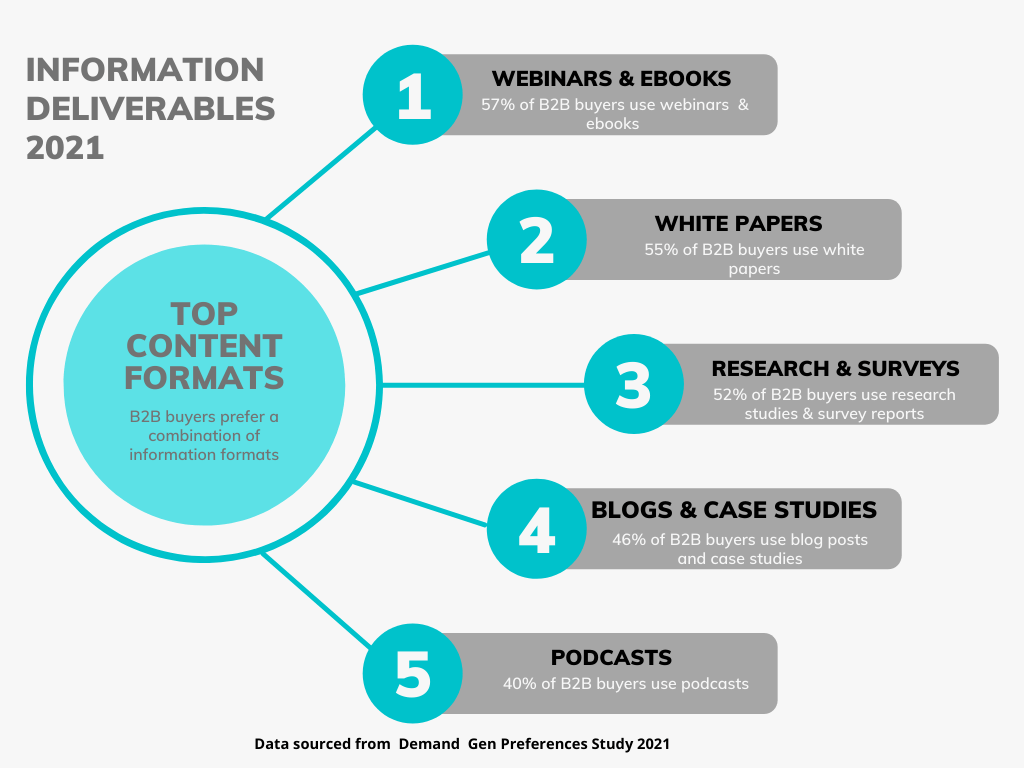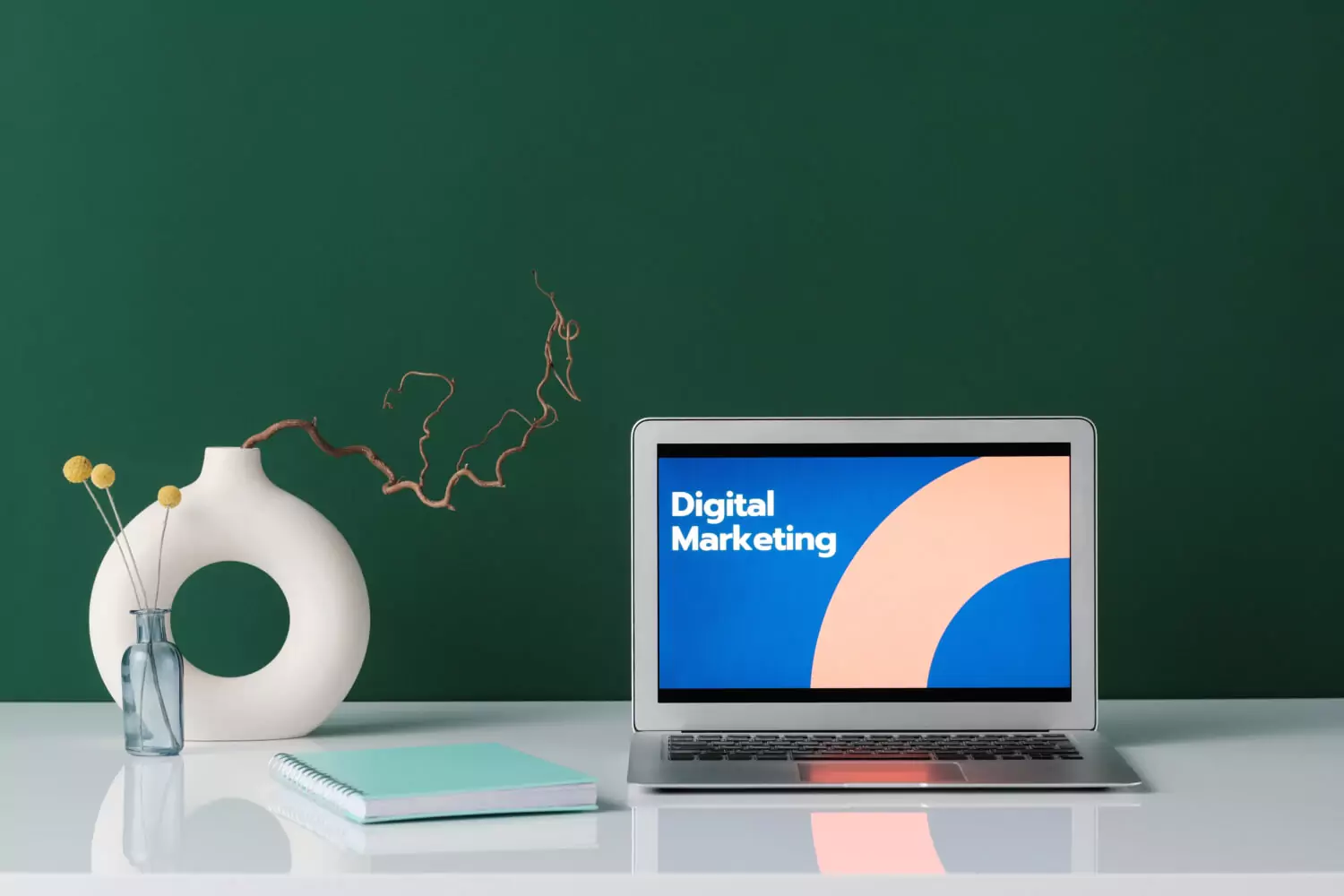Originally published March 24, 2022 , updated on August 9, 2024
Content marketing aims to bring in new visitors, turn them into customers and grow business through information value propositions. Instead of advertising, information supports the marketing team to help buyers reach decisions. Formats for delivery range from white papers to blogs and guides.
For the purpose of this article, we lean on key findings from the Demand Gen 2021 Content Preference Survey of 164 B2B executives in March 2021. The survey results offer valuable insights into the B2B buyer’s interests and consumption patterns.
Quick Takeaways: Top Reasons to Market with Information
Information delivery enables your SaaS SME to:
- Keep your B2B buyer’s attention.
- Answer your reader’s pain points.
- Build brand awareness.
- Improve brand loyalty.
- Add more touchpoints in the buyer’s journey.
- Generate leads.
- Build website traffic.
- Increase sales/subscriptions.
Why Content Marketing Is a Must-Have for SaaS?

What’s the secret to Small to Medium Enterprise (SME) online success?
Don’t compete just give your B2B buyers what they crave – meaningful information tailored to their stage in the buyer’s journey.
Fail to deliver well-researched information, and you miss valuable touchpoints.
Whether you’re going the route alone or with the help of a digital content marketing agency, aim to create and deliver B2B client-focused value.
Inform your target audience on relevant issues, including information about your brand and products. Leverage the art of storytelling throughout the buyer’s journey to increase interest. And keep them interested with data to support your claims.
How Does B2B SME Content Marketing Differ from Traditional PR?
The conventional PR approach disrupts the customer’s business routine with pushed ads and promotions. With the B2B approach, the digital content marketing agency creates value through useful information.
B2B SaaS and tech subscription SMEs work with logic and expertise-driven audiences. The buyers research before they engage. They want information, and therefore, your SME is in the position to meet their needs with relevant content.
Content marketing enables your SME to build brand awareness, showcase services, and nurture client relations. Partnering with a digital content marketing agency enables you to deliver content that explains complex products with insightful information.
Why is Information the Focus for Every B2B Digital Marketing Agency Today?
The Demand Gen 2021 Content Preferences Study confirms heavy reliance on content for decision making. According to the results of the survey, as many as 62% of B2B buyers rely more on accurate research content now than before to make purchase decisions. 44% of B2B buyers read or view at least three content sources before approaching the vendor.
Why is Information the Best Way to Meet B2B Needs?
B2B buyers appreciate expertise. Logic drives their decisions. Deliver content to meet these needs, and your SME hits the sweet spot. Your audience responds better to useful and shareable information than to sales ads. Content marketing enables you to address their pain points at each level of their buying journey.
Which Content Formats Perform the Best?
The Demand Gen 2021 report shows B2B buyers prefer content they can review in 30-60 minutes. Top-performing formats include:
- Blogs
- Webinars
- White papers
- Research reports/surveys
- Case studies
- eBooks
- Podcasts

How Important is Credible Information?
To engage with the B2B buyers at critical touchpoints, deliver relevant information in their preferred formats. If not, your audience will find the information elsewhere – your competitors.
Your audience wants credible information they can share. According to the Data Gen 21 Survey results, 40% of respondents state they want information from credible industry influencers. The report also shows that 32% of buyers trust peer-recommended information.
B2B buyers trust information from research studies, white papers and eBooks the most. Webinars, case studies, and B2B trade publications are next in line.
Data from trusted sources in the preferred formats helps to build trust and establish your brand as a thought leader.
If you don’t have the resources to meet the B2B buyer information needs, partner with a content marketing agency that can deliver. Such an agency will analyse your audience, information needs and your offerings. Each piece of information added to the picture will align with your overall branding strategy.
At the end of the day, it’s about client relations building. People buy from brands they trust. You want your SME to be the one they trust to solve their problems. But first, you give the information they need to learn about their problem, your brand, and how they can trust you to solve their problems.
Why You Need Storytelling in the Mid-Stage of Decision Making

Storytelling and data fuel interest. But SME vendors often neglect the mid-stage of the buyer’s journey, leaving their audience hanging. Instead, the storytelling should continue.
Storytelling gives your business a face. No solution just happens. There’s a story behind it, and that’s what you tell. It establishes trust. You can use storytelling to engage and share how your brand has solved a major problem for a client.
Pro Tip: Close the gap between the awareness and purchase decision-making stages through storytelling.
How to Increase Engagement at Every Stage
During the early stages, buyers rely on the combination of white papers, eBooks, blog posts, and infographics for information.
The mid-stage is where you should increase interactivity with assessments, video content, and help with Return On Investment (ROI) calculation.
At the final stage, you should answer the complex questions and provide in-depth insight into your product or service.
When to Use Case Studies
The experienced digital content marketing agency focuses the technical case study delivery on the late stage of the buyer’s journey.
First, buyers realise they have an issue and need a solution. Then they’re introduced to offerings. Once they’ve explored options, they reach the stage of choosing a solution. At this stage, you deliver the case study to give them answers.
Why Segment Buyers?
Your B2B buyer is often not an individual. Instead, several decision-makers make up the buyer’s committee. The latter decides whether to use your services or platform.
To reach each one is a difficult task at best.
That’s also why the digital content marketing agency segments the decision-makers into buyer personas. Content delivery is tailored to each persona’s preferences in their stage of buying.
Which Information Deliverables Do You Need for Each Stage?

White papers, eBooks, webinars and industry newsletters take precedence during the early stages.
During the consideration stage, research studies and surveys, case studies, and assessments are important.
Case studies and third-party analyst reports take centre stage in the final decision-making phase.
Why Should You Make Information Shareable?
B2B buyers want shareable content. They need to get buy-in from the entire company to onboard your SaaS or tech subscription services. For this, they want data-backed information in easy-consumable and shareable formats.
Pro Tip: Pack long-form content like white papers, case studies, research reports, and eBooks with insights and credible data.
Where Does the Blog Come In?

SaaS and tech subscription services/products are complex. You need more than a few infographics to explain your products.
According to Hubspot, SMEs that blog attract 97% more inbound links, translating into more traffic and better ranking. They also get 67% more leads per month.
Blogging gives your business the opportunity to inform your audience and build trust. If you don’t offer useful content, you lose out on touchpoints.
B2B buyers do independent research before speaking to sales representatives. According to the Demand Gen 2020 Content Preferences Study, at least 48% of B2B buyers read between two and six blog posts before they speak with vendor representatives.
Blogging enables you to share the information your buyers want before they engage with your representatives.
No Content – No Way to Influence B2B Buyers
With the fierce online competition, how do you get your tech subscription service in front of a B2B buyer without push ads?
You guessed right.
Once again, it is content.
According to the latest Gartner Research, B2B buyers spend a meagre 17% of their consideration stage meeting with vendors. Once they’re at the comparison stage, they spend six or fewer minutes per vendor representative. That’s not a lot of time for your representatives to influence their decision making.
Gartner also reports that B2B buyers spend 27% of their decision making time doing independent online research. Providing them with timely content during this stage helps to build trust. Once they’re at the purchase or buy-in stage, they already know everything they need to sign-up.
Given how complex the B2B buying journey is, every piece of information you supply to ease the process is valuable. As noted in the Gartner research, when buyers perceive information from their suppliers as valuable, they’re three times more likely to sign up for a bigger deal without reconsidering their decision.
Your task is to ease their buying journey through information. That’s where a SaaS focused digital content marketing agency eases your pain. The agency manages the process, so you can stay focused on business growth.
How Content Marketing Leads to Sales

Your goal is to get subscriptions to grow your company. Teaming up with Goodman Lantern as your digital marketing agency makes it possible to plan your strategy accordingly. Let’s take a closer look at the information needed for each stage.
Awareness Stage
You’re about to answer the question of why the buyer should change their process. The biggest part of your strategy should be to educate the buyer, create brand awareness, and establish trust.
Don’t expect the buyer to jump for the opportunity to join your email subscription list. First, you have to develop trustworthy and useful content to gain credibility.
Consideration Stage
The buyer now knows your brand. But you cannot rush them into the purchase stage. You should spend a third of your strategy on the consideration stage to answer the question of why the buyer should choose your company. During this phase, you deliver thought leadership content through blog posts, webinars, guides, and eBooks.
Once the buyer trusts you and sees value in your offering, they’re ready for the decision stage.
Decision Stage
At this stage, you need to answer the question of why. Can you solve their particular pain points? Using content deliverables like case studies, blogs, and webinars, you continue to nurture the relationship. The buyer already trusts you but needs to decide if your services and brand match their company’s needs.
Final Stage
Buy-in is only the start. Now the advocacy stage commences. You want to continue the relationship to keep the paying clients happy. You should allocate 5-10% of your strategy to customer retention with manuals and user guides.
What’s the Role of the Digital Content Marketing Agency?

The digital content marketing agency helps SMEs to compete with industry giants through content that:
- Drives traffic
- Establishes credibility
- Builds trust
- Solves pain points
- Engages the customer
- Eases the buying decision
In the complex SaaS and tech subscription environments, SMEs find it difficult to compete without help from a digital content marketing agency. The agency makes sense of the complex information needs of B2B buyers.
With the help of content marketers, your SME can:
- Explain products and services better.
- Deliver information in the right format.
- Meet your audience’s needs.
- Build leads.
- Drive sales.
Key Takeaways
The SaaS industry is complex, and the conventional public relations approach doesn’t work in reaching the decision-makers. With thousands of SMEs competing for the attention of B2B clients, you need content that makes you stand out. To do so means meeting the information needs of B2B buyers in their buyer journey.
Content marketing is an ongoing process that takes up resources. So if you want to focus your resources on business growth, seek help from professionals to create and market content to your B2B audience.
Want to Know More?
See how we help SaaS SMEs with content tailored to the B2B target audience.



















